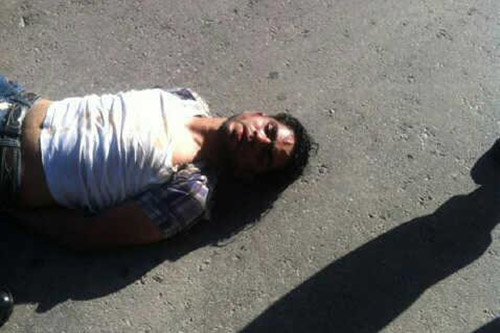27 May 2013
Activists and tweeps broadcast a sound recording of ‘Redha Al-Ghasra’s’ torture during his arrest, and regime loyalists broadcast a photo of him being arrested
The Bahrain Center for Human Rights expresses it deep concern over the continued targeting by the authorities in Bahrain of activists who demand freedom and change, and the prevalence of forced disappearances among those who are arrested. The security forces arrested on Friday morning, 24 May 2013, Redha Abdullah Isa Al-Ghasra – 25 years old – who was wanted by the authorities and who had succeeded in hiding from the security forces, especially the two officers Yousif Al-Mannaie and Ebrahim Habib Al-Ghaith who have reportedly made several threats against Al-Ghasra and his family with murder if he is arrested; this is according to the testimonies from the detainee’s family. No official information was received about him regarding his arrest at the time of writing this report.
Details of the incident began when activists and tweeps broadcasted on their twitter accounts a sound recording of someone moaning of pain, which they claim was a voice recording of the detainee Redha Al-Ghasra while the security forces were reportedly beating and torturing him on the street (see: http://www.youtube.com/watch?v=jxZuVSbPeXQ). While accounts of Bahraini government loyalists broadcasted photographs of Al-Ghasra while he was handcuffed and lying on the ground, blood flowing on his face (see: https://twitter.com/Deertybhr/status/337845219053674496). Another account from an individual affiliated with the Bahraini regime broadcasted a photograph of the detainee Al-Ghasra and beside it a photo of a gun, which he claimed the regime forces had found with Redha Al-Ghasra during his arrest (see: https://twitter.com/Jalad_Almajoos/status/337850467973468160). Eye witnesses stated that at 7:30 in the morning on Friday 24 May 2013, civilian cars surrounded Al-Ghasra who was riding his motorcycle and arrested him in a brutal manner and took him to one of the unofficial torture centers, known as the ‘cavalry’.
The family of the detainee Al-Ghasra stated that they have been intensely targeted – their home was reportedly subjected to 70 house raids between March 2011 and May 2013. The last of these house raids was on Saturday 11 May 2013. The area of Bani Jamra, west of Manama, was surrounded – including Al-Ghasra’s residence – from 9 o’clock at night until 2 o’clock in the morning. The Ministry of Interior announced on Twitter that ‘while a security patrol was carrying out its duties in Bani Jamra, its members heard gunfire from an automatic firearm, and that investigations are under way’ (see: http://manamavoice.com/index.php?plugin=news&act=news_read&id=13211). Al-Ghasra was arrested in May 2011, and was released in August of the same year. Al-Ghasra faces charges that could put him in prison for up to 41 years in various cases in which the Public Prosecution alleges that he assembled and detonated a bomb, in addition to starting fires; he is awaiting a verdict. Since his arrest in April 2012, the government’s targeting of Al-Ghasra has reportedly started to take a more serious turn than before where he and his friend – Aqeel Abdul-Mohsen – were targeted with a gunshot from a close distance that led to his injury in the shoulder while his friend’s face Aqeel was dramatically injured (see: http://manamavoice.com/index.php?plugin=news&act=news_read&id=11436). On Wednesday 29 May 2013, the Court will look into one of the cases of illegal assembly against Redha, however it is not known if will appear in the courtroom given the state of his forced disappearance.
Redha is not the only one targeted in his family, his brother Yasser – 23 years old – has been detained and sentenced to 37 years in prison in 4 different cases; other cases are still pending against him. Although the Ministry of Interior claimed that he escaped from prison, his family stated that they have not received had any information about him for a long time. Additionally, a younger brother Sadiq – 19 years old – was sentenced to 26 years in prison in 3 different cases, and awaits a verdict in seven other cases, and he is one of the prisoners which Nabeel Rajab, President of the BCHR, recently witnessed being tortured in prison. Rajab has since been held in solitary confinement without contact with his family. The family of the kidnapped Redha Al-Ghasra published a statement in which they expressed their concern about their son’s fate and they held the authorities responsible for his wellbeing, especially after the Ministry of Interior denied having him in custody when the family went to ask about him. His family mentioned that Al-Ghasra had an accident when he was very young that caused the amputation of 3 fingers from his right hand (ring, middle and index fingers). The family denied that he would be able to usefully, much less skilfully, carry a gun with his left hand.
The three brothers face charges that vary between illegal assembly and claims of participating in detonating bombs and starting fires. These charges come at a time where the elements of a fair trial are absent in Bahrain, the rights of defendants are not guaranteed, the public prosecution’s investigation is regularly based on confessions extracted under torture during forced disappearances, and where the defendant is often deprived of any contact with his family and lawyer.
Based on the above, the Bahrain Center for Human Rights calls for:
- Immediately reveal the fate of the kidnapped Redha Al-Ghasra and allow him to contact his family for them to be reassured of his condition.
- Hold accountable those responsible for kidnaping and torturing Al-Ghasra.
- Immediately stop the acts of kidnap and forced disappearances of detainees.
- Immediately stop the torture practices that generally begin with the moment of arrest and continue with the aim of extracting confessions, and to bring forth those responsible for such acts to justice.
- Stop targeting activists and provide them with enough space to express their opinion.
- Stop fabricating cases and charges against activists and stigmatizing communities and individuals that witness these acts as ‘terrorists’.

